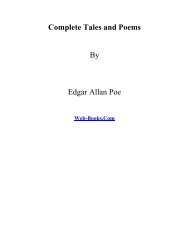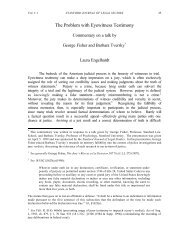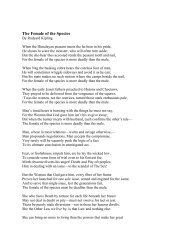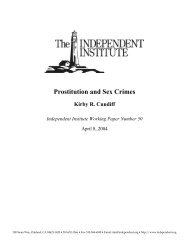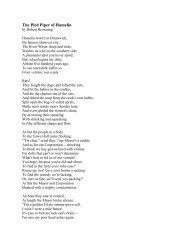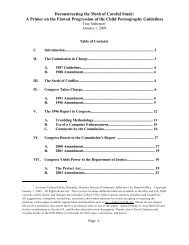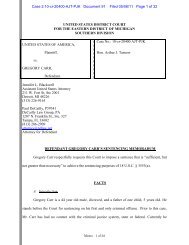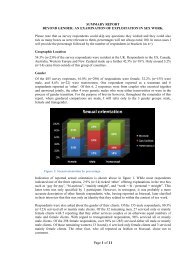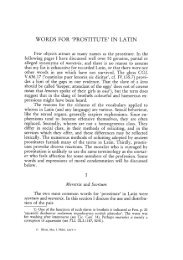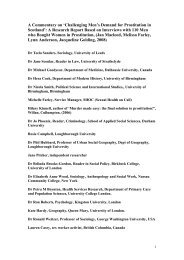- Page 1 and 2:
The Complete Sherlock Holmes Arthur
- Page 3 and 4:
Table of contents A Study In Scarle
- Page 5:
The Case-Book of Sherlock Holmes Pr
- Page 9:
Part I A Study In Scarlet Table of
- Page 13 and 14:
n the year 1878 I took my degree of
- Page 15 and 16:
hardly have given him credit. “Yo
- Page 17 and 18:
stained with chemicals, yet he was
- Page 19 and 20:
possible perfection in it. Before t
- Page 21 and 22:
“Why, that he was a retired serge
- Page 23 and 24:
great strips had become detached an
- Page 25 and 26:
dust from the floor, and packed it
- Page 27 and 28:
the dingiest and dreariest of them
- Page 29 and 30:
I recognized that justice must be d
- Page 31 and 32:
slammed behind our visitor before H
- Page 33 and 34:
“There’s more work to be got ou
- Page 35 and 36:
with a stick in his hand. “I don
- Page 37 and 38:
the mews at the back of the hotel.
- Page 39:
clever as himself. As long as this
- Page 43 and 44:
In the central portion of the great
- Page 45 and 46:
“It don’t matter. It ain’t qu
- Page 47 and 48:
of the episode. Then he turned to t
- Page 49 and 50:
was to deal with cattle, she was no
- Page 51 and 52:
At first this vague and terrible po
- Page 53 and 54:
ger which threatened them, and how
- Page 55 and 56:
So unnerved was he at the sight tha
- Page 57 and 58:
All night their course lay through
- Page 59 and 60:
his way. On the sixth day, he reach
- Page 61 and 62:
A Study In Scarlet CHAPTER VI. A Co
- Page 63 and 64:
nothing more than his paid servant,
- Page 65 and 66:
was the only memento that I had of
- Page 67 and 68:
in criminal annals. The cases of Do
- Page 69:
The Sign of the Four
- Page 73 and 74:
herlock Holmes took his bottle from
- Page 75 and 76:
the neighborhood. So much is observ
- Page 77 and 78:
clear-cut, hawklike features. “St
- Page 79 and 80:
It was half-past five before Holmes
- Page 81 and 82:
We followed the Indian down a sordi
- Page 83 and 84:
to part with, although I had got it
- Page 85 and 86:
dreamily conscious that he was pour
- Page 87 and 88:
I went up and peeped through the ke
- Page 89 and 90:
ope which I see in the corner, secu
- Page 91 and 92:
“On which the dead man very consi
- Page 93 and 94:
only led us, however, to a deeper a
- Page 95 and 96:
“There’s the print of wooden-le
- Page 97 and 98:
“Ah! it’s all right. He’s off
- Page 99 and 100:
“My dear fellow, it would be a co
- Page 101 and 102:
It may be looked upon as the very l
- Page 103 and 104:
Norwood tragedy. They all appeared
- Page 105 and 106:
The old man made a little run towar
- Page 107 and 108:
for the final escape, and hurried t
- Page 109 and 110:
the deck. It straightened itself in
- Page 111 and 112:
a matter of duty, send an inspector
- Page 113 and 114:
you came up with us. However, there
- Page 115 and 116:
doubts as to whether they could arr
- Page 117 and 118:
done up in a shawl. He seemed to be
- Page 119 and 120:
enough all day; though in the eveni
- Page 121 and 122:
up by a convict-gang in the woods.
- Page 123:
The Adventures of Sherlock Holmes
- Page 127:
A Scandal in Bohemia Table of conte
- Page 130 and 131:
the firelight strikes it, the leath
- Page 132 and 133:
“You are right,” he cried; “I
- Page 134 and 135:
groom out of work. There is a wonde
- Page 136 and 137:
He disappeared into his bedroom and
- Page 138 and 139:
We had reached Baker Street and had
- Page 141:
The Red-Headed League
- Page 144 and 145:
you know, for example, that I did m
- Page 146 and 147:
mine. He said a few words to each c
- Page 148 and 149:
shall be happy to look into it. Fro
- Page 150 and 151:
“Very well. And, I say, Doctor, t
- Page 152 and 153:
highest pitch of tension, and my he
- Page 155:
A Case of Identity
- Page 158 and 159:
“I have seen those symptoms befor
- Page 160 and 161:
said she would make it all right wi
- Page 162 and 163:
“That will do,” said Holmes.
- Page 164 and 165:
e pushed as far as it would go if a
- Page 167 and 168:
e were seated at breakfast one morn
- Page 169 and 170:
“It appears that his arrest did n
- Page 171 and 172:
Lestrade looked startled. “I do n
- Page 173 and 174:
armaid, finding from the papers tha
- Page 175 and 176:
“Who was the criminal, then?”
- Page 177:
gold, became wealthy men, and made
- Page 181 and 182:
hen I glance over my notes and reco
- Page 183 and 184:
trembling hand, ‘K. K. K.!’ he
- Page 185 and 186:
“Tut! tut!” cried Sherlock Holm
- Page 187 and 188:
looks as if they always send their
- Page 189:
He took a large sheet of paper from
- Page 193 and 194:
sa Whitney, brother of the late Eli
- Page 195 and 196:
“I was certainly surprised to fin
- Page 197 and 198:
his lodger, and that he could not a
- Page 199 and 200:
“Frankly, then, madam, I do not.
- Page 201 and 202:
drove through the streets of the Su
- Page 203:
entreated him to prevent anyone fro
- Page 207 and 208:
had called upon my friend Sherlock
- Page 209 and 210:
has been hung up indoors most of th
- Page 211 and 212:
occurrences, perhaps I ought to ask
- Page 213 and 214:
“Well?” “That’s the list of
- Page 215 and 216:
as if on some commission, and I mad
- Page 217:
The Adventure of the Speckled Band
- Page 220 and 221:
stand this strain no longer; I shal
- Page 222 and 223:
I seemed to hear a low whistle, suc
- Page 224 and 225:
the other of us, while his deep-set
- Page 226 and 227:
chairs, made up all the furniture i
- Page 228 and 229:
“Did you observe anything very pe
- Page 230 and 231:
of using a form of poison which cou
- Page 233 and 234:
f all the problems which have been
- Page 235 and 236:
of money through my poor father’s
- Page 237 and 238:
into a carriage, the door of which
- Page 239 and 240:
my own curiosity. It was obvious at
- Page 241 and 242:
“They must have done so. I have a
- Page 243:
The Adventure of the Noble Bachelor
- Page 246 and 247:
St. Simon, second son of the Duke o
- Page 248 and 249:
“A most painful matter to me, as
- Page 250 and 251:
“Still, jealousy is a strange tra
- Page 252 and 253:
Simon has not already arrived. Ha!
- Page 254 and 255:
“Then I trust that you at least w
- Page 257 and 258:
olmes,” said I as I stood one mor
- Page 259 and 260:
I should find myself! I determined,
- Page 261 and 262:
arms folded, asked me whether it wa
- Page 263 and 264:
“You heard nothing yourself last
- Page 265 and 266:
the world. Now I am left to a lonel
- Page 267:
“On entering the house, however,
- Page 271 and 272:
o the man who loves art for its own
- Page 273 and 274:
“ ‘Hampshire. Charming rural pl
- Page 275 and 276:
those all-night chemical researches
- Page 277 and 278:
drawing-room, which is a very large
- Page 279 and 280:
“There was a little passage in fr
- Page 281 and 282:
e very much surprised if this were
- Page 283:
The Memoirs of Sherlock Holmes
- Page 287 and 288:
am afraid, Watson, that I shall hav
- Page 289 and 290:
that the stranger was leaning throu
- Page 291 and 292:
“Undoubtedly. He has neither a kn
- Page 293 and 294:
Colonel Ross, who had shown some si
- Page 295 and 296:
“My friend and I return to town b
- Page 297 and 298:
“It was the first link in my chai
- Page 299:
The Yellow Face
- Page 302 and 303:
“This is Grosvenor mixture at eig
- Page 304 and 305:
set and rigid about it which was sh
- Page 306 and 307:
secret which was casting a shadow o
- Page 308 and 309:
We turned a corner in the lane as h
- Page 311:
The Stock-Broker’s Clerk
- Page 314 and 315:
“Ah! Then you got hold of the bes
- Page 316 and 317:
“ ‘Precisely what I don’t wan
- Page 318 and 319:
Following his lead, we ascended fiv
- Page 320 and 321:
family resemblance. But for the hap
- Page 323 and 324:
have some papers here,” said my f
- Page 325 and 326:
came out to say that there was a ma
- Page 327 and 328:
“My friend ascended with the doct
- Page 329 and 330:
“ ‘ “Well, where d’ye suppo
- Page 331:
him with a match-box in his hand se
- Page 335 and 336:
n anomaly which often struck me in
- Page 337 and 338:
was first taken up by my father, bu
- Page 339 and 340:
the body could we find. On the othe
- Page 341 and 342:
“From this starting-point I proce
- Page 343:
“ ‘What is it, then?’ he gasp
- Page 347 and 348:
t was some time before the health o
- Page 349 and 350:
course this Acton business has put
- Page 351 and 352:
house. You appear to take it for gr
- Page 353 and 354:
“And where was it?” “Where I
- Page 355:
“It is an art which is often usef
- Page 359 and 360:
ne summer night, a few months after
- Page 361 and 362:
her return. The blinds were not dow
- Page 363 and 364:
the curious fact that the intruder
- Page 365 and 366:
The man gave a violent start. “I
- Page 367:
The Resident Patient
- Page 370 and 371:
the portrait were framed it would j
- Page 372 and 373:
apidly to the front, and during the
- Page 374 and 375:
He relit the stair gas as he spoke,
- Page 376 and 377:
“Why should any one murder a man
- Page 379:
The Greek Interpreter
- Page 382 and 383:
of their fellows. Yet they are not
- Page 384 and 385:
Sometimes the rattle of the stones
- Page 386 and 387:
We all sat in silence for some litt
- Page 388 and 389:
which Mr. Melas had found himself.
- Page 391:
The Naval Treaty
- Page 394 and 395:
and finally brought a test-tube con
- Page 396 and 397:
the hall, where I found the commiss
- Page 398 and 399:
had not dared to think of what woul
- Page 400 and 401:
“Well, we have several, but we ca
- Page 402 and 403:
“I should,” said Lord Holdhurst
- Page 404 and 405:
“No, thank you, Joseph. I have a
- Page 406 and 407:
the centre of it was lying a little
- Page 408 and 409:
“Why did he try the window on the
- Page 411 and 412:
t is with a heavy heart that I take
- Page 413 and 414:
the door opened and Professor Moria
- Page 415 and 416:
turned the carriage, and dashed awa
- Page 417 and 418:
“I think that I may go so far as
- Page 419:
seething foam, will lie for all tim
- Page 423:
The Adventure of the Empty House
- Page 426 and 427:
to their cries and knocking. Help w
- Page 428 and 429:
“I stood up and examined the rock
- Page 430 and 431:
in his own creation. “It really i
- Page 432 and 433:
“I wonder that my very simple str
- Page 434 and 435:
Colonel Moran had done it? He had p
- Page 437 and 438:
om the point of view of the crimina
- Page 439 and 440:
is that a most sensational crime ha
- Page 441 and 442:
will which he did not intend ever t
- Page 443 and 444:
een opened by the police. They were
- Page 445 and 446:
“It is unquestionably the mark of
- Page 447:
“Very simply. When those packets
- Page 451 and 452:
olmes had been seated for some hour
- Page 453 and 454:
“A promise is a promise, Mr. Holm
- Page 455 and 456:
upon a cable form. “If my answer
- Page 457 and 458:
of powder from the moment that they
- Page 459 and 460:
new to me. The object of those who
- Page 461 and 462:
the husband whom she loved and resp
- Page 463:
The Adventure of the Solitary Cycli
- Page 466 and 467:
seemed strange to us that Uncle Ral
- Page 468 and 469:
9.13. At Farnham Station I had no d
- Page 470 and 471:
a glimpse of him again this morning
- Page 472 and 473:
“You have heard of me, I see. I w
- Page 475:
The Adventure of the Priory School
- Page 478 and 479:
founder and principal. ‘Huxtable
- Page 480 and 481:
“I will order a four-wheeler. In
- Page 482 and 483:
Moor, extending for ten miles and s
- Page 484 and 485:
“But I need your company and assi
- Page 486 and 487:
“Why, Mr. Reuben Hayes,” said H
- Page 488 and 489:
Never shall I forget the Duke’s a
- Page 490 and 491:
“What are promises to such people
- Page 493 and 494:
have never known my friend to be in
- Page 495 and 496:
door they saw a sight which sent th
- Page 497 and 498:
“This is a most extraordinary thi
- Page 499 and 500:
with the initials of our prisoner o
- Page 501 and 502:
You say I murdered Peter Carey; I s
- Page 503:
The Adventure of Charles Augustus M
- Page 506 and 507:
hairless face, a perpetual frozen s
- Page 508 and 509:
though technically criminal. To bur
- Page 510 and 511:
murmur broke itself into the measur
- Page 512 and 513:
“A murder—a most dramatic and r
- Page 515 and 516:
t was no very unusual thing for Mr.
- Page 517 and 518:
As it is I am giving away valuable
- Page 519 and 520:
though. Why, it’s Beppo. He was a
- Page 521 and 522:
letter to send, and it is important
- Page 523 and 524:
and struck Napoleon a sharp blow on
- Page 525:
The Adventure of the Three Students
- Page 528 and 529:
“For an instant I imagined that B
- Page 530 and 531:
in this room we had the man prisone
- Page 532 and 533:
“He looked at us in a queer way.
- Page 534 and 535:
“Well, when he saw that they were
- Page 537 and 538:
hen I look at the three massive man
- Page 539 and 540:
Susan with the body, she hurried to
- Page 541 and 542:
“If it is not asking too much, Mr
- Page 543 and 544:
know nothing about it. I would only
- Page 545 and 546:
Again the Professor burst into high
- Page 547:
of my remarks, that Professor Coram
- Page 551 and 552:
e were fairly accustomed to receive
- Page 553 and 554:
to this hotel, and see if the porte
- Page 555 and 556:
“It’s worth trying, Watson,”
- Page 557 and 558:
These few inquiries proved, however
- Page 559 and 560:
not be fast, but I expect you will
- Page 561:
The Adventure of the Abbey Grange
- Page 564 and 565:
Sydenham a fortnight ago, and were
- Page 566 and 567:
aquiline features were convulsed in
- Page 568 and 569:
“Their cumulative effect is certa
- Page 570 and 571:
take him into my confidence yet. I
- Page 572 and 573:
“Well, I never thought to see her
- Page 575:
The Adventure of the Second Stain
- Page 578 and 579:
have known that there was anything
- Page 580 and 581:
you, and you will no doubt let us k
- Page 582 and 583:
“Now, Watson, the fair sex is you
- Page 584 and 585:
knocked at the door—surprise visi
- Page 586 and 587:
ask you, madam, to be kind enough t
- Page 588 and 589:
“Purely negative as yet,” my fr
- Page 591:
The Hound of the Baskervilles Table
- Page 594 and 595:
fresh basis from which to start our
- Page 596 and 597:
“I have in my pocket a manuscript
- Page 598 and 599:
ken men for the rest of their days.
- Page 600 and 601:
go out upon the moor at night. Incr
- Page 602 and 603:
hard-headed countryman, one a farri
- Page 604 and 605:
“Yes, the setting is a worthy one
- Page 606 and 607:
“If any possible doubt remained i
- Page 608 and 609:
“Whichever it is, my answer is fi
- Page 610 and 611:
Sherlock Holmes had, in a very rema
- Page 612 and 613:
settlement from Sir Charles, though
- Page 614 and 615:
driving Mr. Sherlock Holmes.’ Tha
- Page 616 and 617:
glanced keenly at us as we passed.
- Page 618 and 619:
edrooms opened. My own was in the s
- Page 620 and 621:
hat. A tin box for botanical specim
- Page 622 and 623:
“Yes, it’s rather an uncanny pl
- Page 624 and 625:
e frank with me, Miss Stapleton, fo
- Page 626 and 627:
ipen into love, and I have several
- Page 628 and 629:
some ways they have become more com
- Page 630 and 631:
What’s the matter with me, anyhow
- Page 632 and 633:
“And you go in disgrace. By thund
- Page 634 and 635:
Baskerville Hall. A boulder of gran
- Page 636 and 637:
strangely shaken by that sound upon
- Page 638 and 639:
people living within driving distan
- Page 640 and 641:
the second was criticism. There was
- Page 642 and 643:
I should explore every hut upon the
- Page 644 and 645:
A vague pathway among the boulders
- Page 646 and 647:
“But why keep me in the dark?”
- Page 648 and 649:
ody hunched together as if in the a
- Page 650 and 651:
“I would suggest carrying this po
- Page 652 and 653:
with the wig ought to be a Reynolds
- Page 654 and 655:
has informed me of what you have co
- Page 656 and 657:
the position of the rooms? What are
- Page 658 and 659:
“To leave you here. You are not f
- Page 660 and 661:
London, Watson, and I say it again
- Page 662 and 663:
alarmed the country-side, and final
- Page 664 and 665:
timacy he made it certain that Sir
- Page 667:
Part I The Valley Of Fear Table of
- Page 671 and 672:
am inclined to think—” said I.
- Page 673 and 674:
large book which is surely somethin
- Page 675 and 676:
Yet, if his emotions were dulled, h
- Page 677 and 678:
“Six thousand a year. That’s pa
- Page 679 and 680:
drawbridge, the chains and windlass
- Page 681 and 682:
“You mean that someone waded acro
- Page 683 and 684:
expression of surprised and reveren
- Page 685 and 686:
“Anything fresh, Sergeant Wilson?
- Page 687 and 688:
“Sorry to interrupt your consulta
- Page 689 and 690:
thought that someone was after him.
- Page 691 and 692:
Mrs. Douglas thought earnestly befo
- Page 693 and 694:
produced upon my mind. “We though
- Page 695 and 696:
“We will suppose that this couple
- Page 697 and 698:
with bicycle and valise. In the lat
- Page 699 and 700:
“I don’t doubt it, Mr. Holmes;
- Page 701 and 702:
Holmes took a swift glance round, a
- Page 703 and 704:
to California, then they chased me
- Page 705:
PART II. The Scowrers
- Page 708 and 709:
“Hullo, mate!” said he. “You
- Page 710 and 711:
“How could I have heard of him wh
- Page 712 and 713:
“What, does he hate the police to
- Page 714 and 715:
“Aren’t you?” The man’s sav
- Page 716 and 717:
“I have had that name among those
- Page 718 and 719:
On the day following the evening wh
- Page 720 and 721:
the assembly within. Once or twice
- Page 722 and 723:
“Jim was shot last month when the
- Page 724 and 725:
Ted Baldwin looked at McMurdo with
- Page 726 and 727:
life in your hands by what I say; b
- Page 728 and 729:
“I guess you’ll pay for this, C
- Page 730 and 731:
“What’s come over you, Jack?”
- Page 732 and 733:
Day was breaking now, and a line of
- Page 734 and 735:
quarries. It was two in the morning
- Page 736 and 737:
McMurdo sat in silence for some tim
- Page 738 and 739:
The usual revelry of the lodge was
- Page 740 and 741:
McMurdo shrugged his shoulders. “
- Page 742 and 743:
more besides yourselves that will s
- Page 744 and 745:
“I can only say that the first wo
- Page 747:
Preface The friends of Mr. Sherlock
- Page 751:
The Adventure of Wisteria Lodge Tab
- Page 754 and 755:
ad habit of telling his stories wro
- Page 756 and 757:
ow. With a slow smile he drew a fol
- Page 758 and 759:
yourself insensibly twisting them r
- Page 760 and 761:
Then from the table he took a platt
- Page 762 and 763:
a dangerous one, and if Garcia did
- Page 764 and 765:
Baynes flushed with pleasure. “I
- Page 766 and 767:
emarkable only for the fact that am
- Page 769 and 770:
n choosing a few typical cases whic
- Page 771 and 772:
e the most feasible, but if you sho
- Page 773 and 774:
“Yes, you are quite right. Those
- Page 775 and 776:
noted their anatomical peculiaritie
- Page 777 and 778:
compliment to me that you can’t b
- Page 779:
The Adventure of the Red Circle
- Page 783 and 784: ell, Mrs. Warren, I cannot see that
- Page 785 and 786: are good reasons to suspect that th
- Page 787 and 788: “Education never ends, Watson. It
- Page 789 and 790: projected the white haft of a knife
- Page 791: “A few days later came the meetin
- Page 795 and 796: n the third week of November, in th
- Page 797 and 798: here he comes, if I am not mistaken
- Page 799 and 800: the Bruce-Partington submarine are
- Page 801 and 802: A small but well-kept house in the
- Page 803 and 804: And yet we have surely made some ap
- Page 805 and 806: “Here we are, Watson—this must
- Page 807 and 808: keys which your brother held; and t
- Page 809: The Adventure of the Dying Detectiv
- Page 812 and 813: “If you will stand there I will t
- Page 814 and 815: front of him. Make any excuse so as
- Page 816 and 817: “The same,” said Holmes. “Ah!
- Page 818 and 819: was clear to me, however, that by p
- Page 821 and 822: ut why Turkish?” asked Mr. Sherlo
- Page 823 and 824: Frances had started thither in thei
- Page 825 and 826: most unscrupulous rascals that Aust
- Page 827 and 828: He had rung loudly at the door of a
- Page 829: men, appeared on the threshold. Hol
- Page 834 and 835: church. The vicar of the parish, Mr
- Page 836 and 837: two great apes. Oh, it was awful to
- Page 838 and 839: asking Holmes in an eager voice whe
- Page 840 and 841: tion between three things—the bur
- Page 842 and 843: “What do you mean?” he asked at
- Page 844 and 845: Holmes sat for some little time in
- Page 847 and 848: t was nine o’clock at night upon
- Page 849 and 850: “Sparking plugs, eh?” “You se
- Page 851 and 852: these things? Steiner is the fifth
- Page 853 and 854: I have long had an eye upon him. Mi
- Page 855: The Case-Book of Sherlock Holmes
- Page 859: The Illustrious Client
- Page 862 and 863: “No, it is more serious than that
- Page 864 and 865: am glad to have had my attention ca
- Page 866 and 867: “None of that, Mr. Holmes,” cri
- Page 868 and 869: I have my plans. The first thing is
- Page 870 and 871: “Very mysterious,” said he with
- Page 872 and 873: “It is a loyal friend and a chiva
- Page 875 and 876: he ideas of my friend Watson, thoug
- Page 877 and 878: the table. He looked up at last wit
- Page 879 and 880: “I really took no notice.” “P
- Page 881 and 882: took out my notebook and scribbled
- Page 883:
then, had to be sifted and balanced
- Page 887 and 888:
t was pleasant to Dr. Watson to fin
- Page 889 and 890:
Watson waited until the door was cl
- Page 891 and 892:
Ikey Sanders, who refused to cut it
- Page 893 and 894:
villains staggered back in utter am
- Page 895:
The Adventure of the Three Gables
- Page 898 and 899:
“But what is it?” “I was goin
- Page 900 and 901:
“Settled once again,” said Holm
- Page 902 and 903:
“It seems a queer thing to break
- Page 904 and 905:
away, and were, I admit, a little r
- Page 907 and 908:
olmes had read carefully a note whi
- Page 909 and 910:
So the matter stands. She is now co
- Page 911 and 912:
original yeoman farmer of the seven
- Page 913 and 914:
The boy cooed and nestled his head
- Page 915:
The Adventure of the Three Garrideb
- Page 918 and 919:
“Why did he ever drag you into it
- Page 920 and 921:
“Now and again I drive down to So
- Page 922 and 923:
know my Watson by now. But there is
- Page 924 and 925:
castle in the air fell down, it bur
- Page 927 and 928:
omewhere in the vaults of the bank
- Page 929 and 930:
“I know you have,” our visitor
- Page 931 and 932:
The Gold King paused for a moment a
- Page 933 and 934:
to a side-gate opening into the gro
- Page 935 and 936:
“Perhaps Mr. Neil Gibson has told
- Page 937 and 938:
I had no glimmer of what was in his
- Page 939:
The Adventure of the Creeping Man
- Page 942 and 943:
his master, save on very special oc
- Page 944 and 945:
love affair. He made a journey abro
- Page 946 and 947:
Sulkily our host—if I may call hi
- Page 948 and 949:
egan after his visit to Prague, tha
- Page 951:
The Adventure of the Lion’s Mane
- Page 954 and 955:
was blood dripping down his chin, f
- Page 956 and 957:
Murdoch’s face flushed with anger
- Page 958 and 959:
to be in a nightmare in which you f
- Page 960 and 961:
of rocks lay above it at the base o
- Page 963:
The Adventure of the Veiled Lodger
- Page 966 and 967:
she cried. It was in the night, and
- Page 968 and 969:
“I learned it when I had recovere
- Page 971:
The Adventure of Shoscombe Old Plac
- Page 974 and 975:
Holmes raised his eyebrows. “This
- Page 976 and 977:
“Exactly!” Holmes had become ve
- Page 978 and 979:
enewed activity. Once more we found
- Page 980 and 981:
of the coffins of her husband’s a
- Page 983 and 984:
herlock Holmes was in a melancholy
- Page 985 and 986:
“Well, he was painting the passag
- Page 987 and 988:
malevolent scowl. None the less, he
- Page 989:
observed it. You’ll get results,



